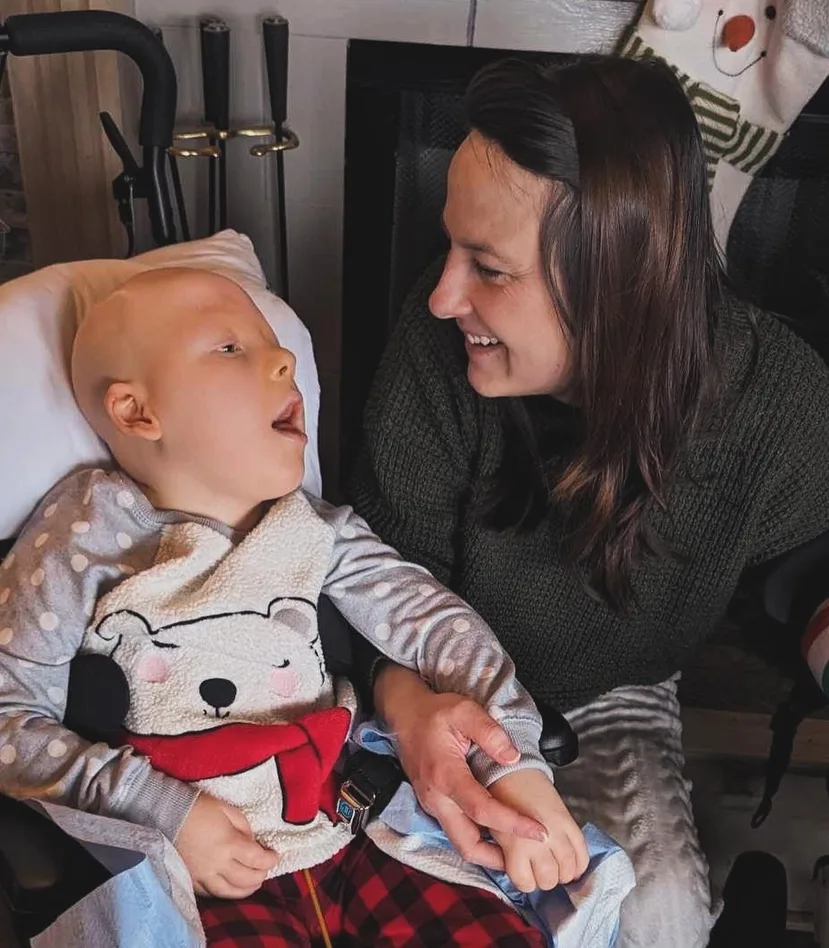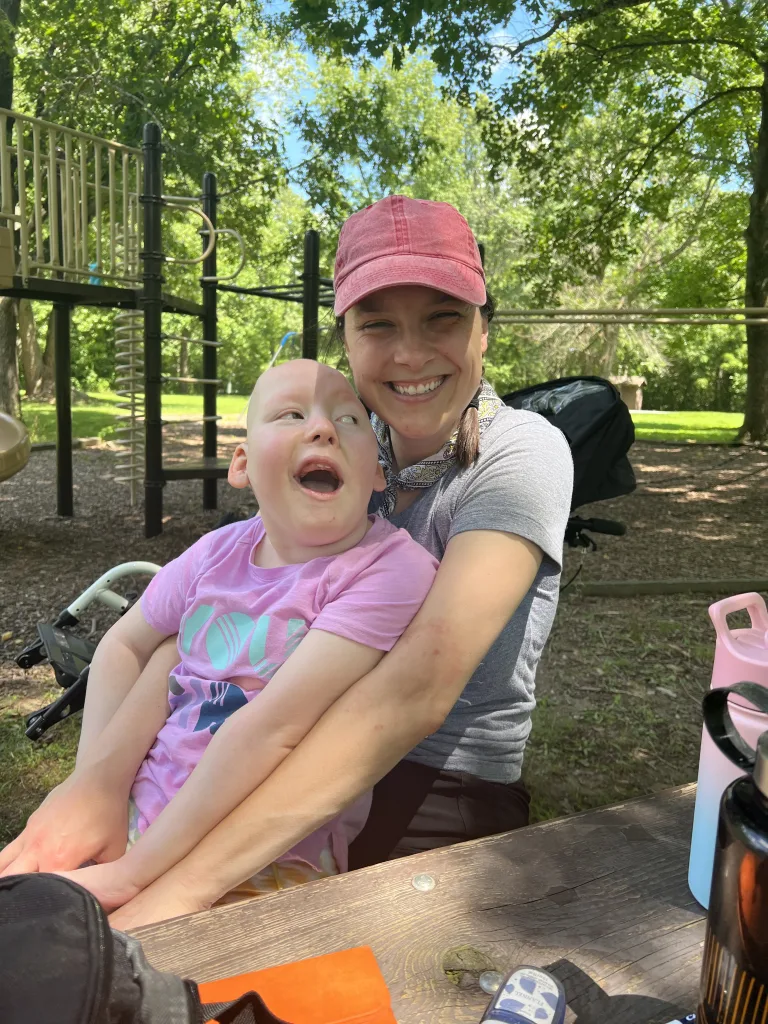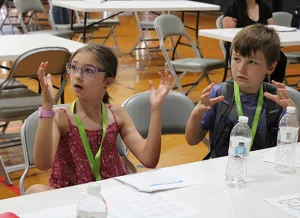DSCC’s New Home Care Family Outreach Associate is Available to Support Families
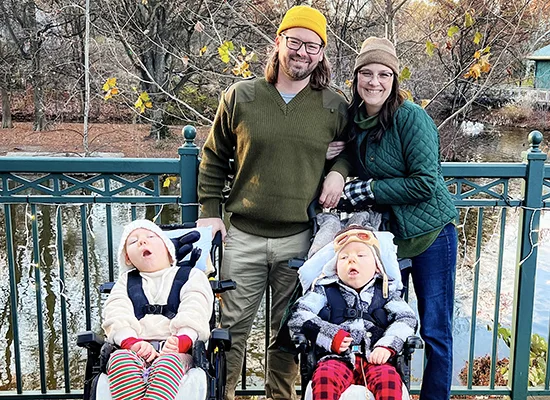
Our Home Care Family Outreach Associate Erica Stearns can offer support, connection and empowerment for DSCC families caring for loved ones with complex medical needs.
We understand that caring for a loved one with complex medical needs can pose unique and sometimes unexpected challenges for families.
We are excited to introduce a new Home Care Family Outreach Associate (HCFOA) on our team who understands these challenges and can provide heartfelt support.
With lived experience as a patient, parent and caregiver, our HCFOA can recognize shared experiences and guide families through the complexities of multiple systems of care.
Our HCFOA also works to create a sense of community for caregivers within the Division of Specialized Care for Children (DSCC). In this community, families can feel supported, empowered and more confident in their caregiving journey.
Erica Stearns recently joined DSCC as our first HCFOA. She is the proud parent of two children, Margot and Caratacus, who have been enrolled in the Core and Home Care programs since 2016. They reside in southern Illinois and enjoy the beauty of the Shawnee National Forest.
Erica also serves as the co-chair of DSCC’s Family Advisory Council. You can learn more about Erica, her family and her caregiving journey in The Stearns Family Story.
As our HCFOA, Erica works hand-in-hand with families and caregivers to:
- Create trusting partnerships
- Offer tailored support in addition to the care coordination services they receive from DSCC
- Provide essential caregiver resources
Erica helps ensure that caregivers are equipped with the knowledge and skills they need to advocate for their children and navigate complex systems of care. She can help support your family as you navigate:
- Adjusting to a new norm
- Needing support for your child/loved one’s medical needs and increased level of care
- Looking for guidance on what to expect
- Wanting to connect with other families
Families can request to connect with Erica in several ways. You can ask your DSCC care coordination team to refer you to the HCFOA. You can also email a request to speak with Erica at DSCC-FamilySupport@uic.edu.
For more information about the HCFOA and Erica, please visit our Home Care Family Outreach page.
Institute Provides Education, Support and Connection for Families of Children with Hearing Loss
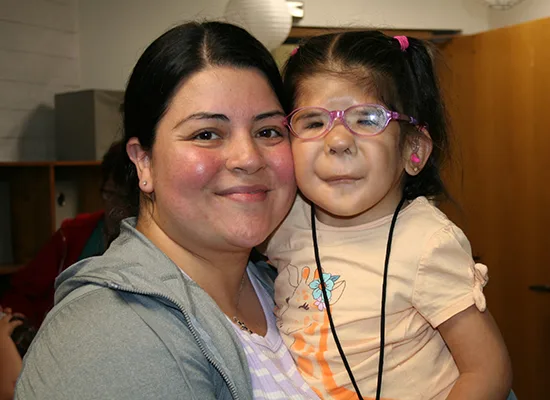
Illinois families gained knowledge and formed priceless relationships during the 2023 Institute for Parents of Preschool Children Who Are Deaf or Hard of Hearing.
The journey to the 2023 Institute for Parents of Preschool Children Who Are Deaf or Hard of Hearing was a mixture of excitement, nerves and some fear for Kelly Lane and Crystal Harris.
When they received the flyer for the free one-week program at the Illinois School for the Deaf in Jacksonville, they were skeptical it would be the right fit for their son, Casper.
Casper, 4, has bilateral hearing loss, epilepsy and a developmental delay.
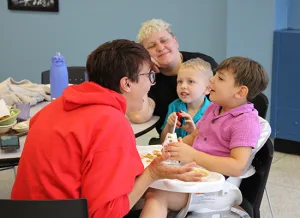
“We’ve been to other events on a smaller scale before that were geared towards families with kids who have hearing loss and felt out of place there because our son also has other disabilities,” Kelly said.
Crystal called the number on the flyer and spoke with Violet Wiker, the Family Liaison for the University of Illinois Chicago’s Division of Specialized Care for Children. Violet helps families enroll in the Institute and addresses any questions or concerns they may have.
Crystal said she talked to Violet for more than two hours.
“She assured me that there were kids of all different learning abilities here, that they would be in a classroom setting… she really sold it to me, really made me feel comfortable,” Crystal said.
She and Kelly then made the trip from Chicago with Casper and his big brother, Courtland. Once they arrived on the School for the Deaf campus, they knew they made the right choice.
“We couldn’t have felt more welcome… We’re used to feeling out of place, so it felt really good to come somewhere and feel normal for once,” Kelly said. “Coming here just felt like going home.”
A total of 22 families from across the state attended this year’s Institute from June 11-16. The Institute is for Illinois parents of children from birth to age 7 who have a significant hearing loss.
Participating parents attend daily lectures by experts in the field to learn about raising a child with hearing loss. Lecture topics include:
- Child development
- Types of hearing loss
- Language development
- Communication choices
- Assistive communication devices
- Deaf culture
- School programming
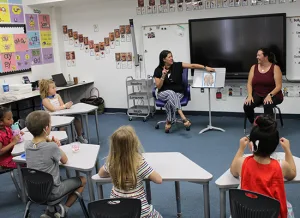
Other activities include meeting in small groups to discuss specific concerns and connecting with other caregivers.
The children with hearing loss attend classrooms based on their age group. Experienced teachers and aides for children who are deaf or hard of hearing oversee these classrooms.
Attending children also can receive hearing, vision, psychological, speech, language and educational evaluations. They also get to play with other children who have a hearing loss.
Siblings also attend the Institute and participate in fun and educational activities, including art projects and learning to sign.
There is no cost for families to participate in the Institute. Meals and housing are provided at no charge.
“One place, all questions answered”
Laura Colic’s son Liam is almost 5 and profoundly deaf. He wears bilateral cochlear implants that he’s had for a little over a year.
“I just wanted to get as much information to make sure that we give him all the opportunities, especially since he’s starting kindergarten in the fall,” Laura said of her decision to attend.
One of her favorite experiences from the week was listening to a panel of Deaf adults share their experiences.
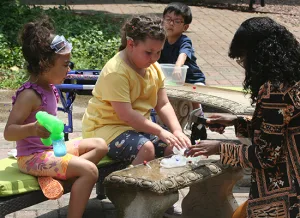
“When you’re in it with little ones, it’s hard to see what that may look like as they grow up. I love the exposure to just the Deaf culture. Even Liam has loved that. He has been so excited to see adults with cochlear implants” she said.
Laura also praised the knowledge of the team of professionals who spoke with families and provided evaluations for the children.
“Their knowledge is phenomenal, and I feel like it’s golden,” she said.
“I wish I could take them with me back home and just create this bubble for Liam. But I’m happy to take the knowledge that they’ve given me, the assessments they’ve provided, the one-to-one time with each of the different people that have worked with Liam and assessed Liam. The evaluations are just phenomenal.”
Sylvia Gavina is mom to 4-year-old Freddy. She appreciated the opportunity to see and understand what Freddy’s hearing loss truly means for him.
“Being able to meet with the professionals and learn what we did in a week takes it to a different level. At home, you might have an appointment one week and then wait three months for the next one. Here, we are leaving with a baseline. One place, all questions answered,” she said.
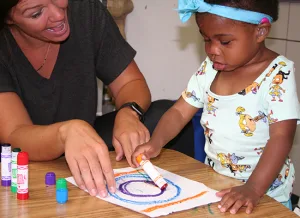
Sheryl Stone’s daughter Nevaeh is 4 ½ and attends the Illinois School for the Deaf. She said the Institute gave her an eye-opening look into how Nevaeh experiences the world. An education session on the Deaf experience helped her understand better what it’s like to not hear and to rely on lip-reading, sign language and other communication methods.
Eddi Fowler said she also learned how to better communicate with her 2 ½-year-old daughter, Kacey. In addition to learning American Sign Language (ASL) and cued speech, Eddi learned more about available resources and how to advocate for Kacey.
“I learned a lot, and I have a lot to take back home with me. I’ve got gigantic paperwork that’s going to help Kacey and my little family throughout the year with her education needs, her hearing loss, her autism, everything,” Eddi said.
“A community of families”
Three-year-old Christian has hearing loss in both of his ears. His parents Basia and Aaron said watching their son become more social with the other children was especially rewarding.
“He’s more expressive. With all the signing and the cued speech that we’re integrating, he’s using his hands more, different modes of communication. That’s something that we were really trying hard to get out of him at home and it’s been tough. But he seemed to really just open up to more people and other children as well,” Aaron said.
Sarah Berns attended the Institute with her son, Colsen, and daughter, Evelyn. Colsen, 7, was born with bilateral sensorineural hearing loss. However, his family was not aware of his hearing loss until he was 3 years old.
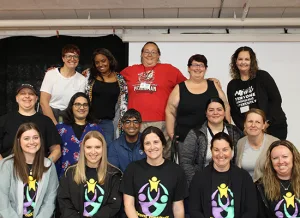
The Institute was the first time he could see other kids with hearing aids and cochlear implants and simply play with them and have fun.
Sarah said she also found a special connection with the other parents.
“I felt like I was all alone. And now I feel like I have a community of families that I can call when I need to talk to them about anything. I also got a lot of information about what my son is going through and what it’s like to be hearing impaired, which is the best connection that I could have with my son, and knowing more about him and what he needs,” she said.
The Institute was also just as valuable for Colsen’s big sister Evelyn.
“She sees that (hearing loss) isn’t something that’s terrible, her brother isn’t annoying, and that there’s this really cool language now that we can have between us that she wasn’t interested in before,” Sarah said. “There’s value in it for her… she has a newfound empathy that she didn’t have before.”
Sarah encourages all families of children with hearing loss to make the trip to the Institute.
“It is life-changing. There are people that value you for who you are, and they are only here to help and give you strategies to help you,” she said.
“A sense of comfort”
After spending a week at the Institute, Kelly and Crystal said they didn’t want to leave.
“We’re not ready to go home. This past week, I’ve felt a sense of comfort that I haven’t felt in a very long time,” Crystal said.
“And that’s saying a lot considering how much information overload has been happening,” Kelly added. “I feel like we should be feeling frazzled and overwhelmed with the amount of new information we’ve gotten, but instead I just feel clarity. I feel clear on where my son’s at, where we need to go, and the options that we have and resources that we have at our disposal.”
Sarah shared a similar sense of peace and optimism for her son, Colsen, after attending the Institute.
“Even though life is not the same plan I thought it was going to be, it’s still going to be wonderful…” she said. “Seeing these other people going through this and through their life, how their life has been impacted by having hearing loss, I realize that (Colsen) really hasn’t lost anything. He is just experiencing it in a different way, and that that’s OK, and that we’re going to be OK.”
Visit our Facebook page to see a photo album with more photos from this year’s program. You can also see videos that highlight different parts of the Institute experience on our YouTube playlist.
The following organizations supported the 2023 Institute:
- University of Illinois Chicago’s Division of Specialized Care for Children (DSCC)
- Department of Human Services – Division of Rehabilitation Services
- Illinois School for the Deaf
- Illinois State Board of Education
- Illinois Department of Public Health
- Ann & Robert H. Lurie Children’s Hospital of Chicago
The 2024 Institute will take place June 13-16. Please see the below flyers for more details:
For more information about the Institute and how DSCC supports children with hearing loss, call (800) 322-3722 or email dsccinstitute@uic.edu.
Social Connection Helps Physical and Mental Health
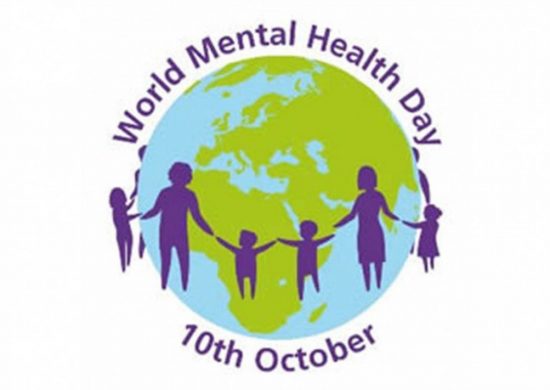
To celebrate World Mental Health Day, DSCC promotes the importance of social connection and ways to support it.
The University of Illinois at Chicago’s Division of Specialized Care for Children (DSCC) is committed to strengthening families and building healthy communities.
We encourage our participant families, providers, community partners and all Illinois residents to join us in recognizing World Mental Health Day on Oct. 10.
To celebrate, DSCC Quality Improvement Specialist Diane Becker shares the latest research on how social connection affects both our physical and mental health:
We know that for all of us to grow, develop and thrive in Illinois, it requires us to work together as a community to remain safe and support each other.
This support includes creating opportunities for positive social connections and providing information and access to mental health support.
Positive social connections allow us to feel valued. They also provide opportunities to work together to solve problems.
Growing research shows more physical and mental health benefits to creating and maintaining these relationships. Positive connections create chemical changes that affect the immune system, nervous system, glucose levels and blood pressure.
The American Psychological Association’s article, Life-saving Relationships, provides more evidence of emotional connections and health.
The World Health Organization (WHO) is leading the conversation about mental health in positive terms and showing its connection to overall health and wellbeing. Social and environmental factors known to affect physical and mental health include:
* Food and housing security
* Safety in the home, school, work and community
* Access to care
* Connection to others
Mental health services are available throughout Illinois to offer connection and supports, even during this time of social distancing.
DSCC staff can also help you find available services and resources in your area to meet your unique needs.
Services are a safe and consistent place to move forward in adjustment or recovery to any setback, trauma, grief or loss that you may be experiencing.
Supports can also benefit anyone seeking a healthier way to work through difficult or complex emotions, to challenge negative thinking patterns or to learn new techniques.
The National Institute of Mental Health offers good information on a variety of mental health resources and assistance that are availbale if you think you may need more support.
Access to care remains DSCC’s priority.
Our team members are available to connect you with other families for peer-to-peer support. We can also share additional health supports and services in the community.
To learn more, please reach out to your local DSCC Regional Office or call us at (800) 322-3722.
You can also visit our online Resource Directory for additional support.
Featured resources include:
- Mental Health Resources Handout
- National Alliance on Mental Illness (NAMI)
- Mental Health America of Illinois
- Illinois Mental Health Collaborative for Access and Choice
- National Suicide Prevention Lifeline
- Coping With Stress
- Call4Calm Text Line
- How Teenagers Can Protect Their Mental Health During COVID-19
- Mental Health First Aid USA COVID-19 Resources
- Resources for Supporting Children’s Emotional Well-Being During the COVID-19 Pandemic
- Self-Care Inventory Tool
- The National Federation of Families for Children’s Mental Health’s COVID-19 Resources for Parents, Families and Youth
- How to Help Children Build Resilience in Uncertain Times
- Emotional Well-Being Toolkit: Resources for Children, Families and Caregivers
- Expressing, Coping, Reframing: Addressing the Mental Health of ‘Quaranteens’ in the Time of COVID-19
- PTSD During a Pandemic for Parents with Medically Fragile Children
- Young Children at Home During the COVID-19 Outbreak: The Importance of Self-Care
Star Raft Project Builds Support for Individuals With Disabilities

Project to help people with disabilities and their families build a circle of support, connection and safety
The Arc of Illinois and the Illinois Council on Developmental Disabilities have launched a project to help individuals with disabilities and their families/caregivers through the COVID-19 pandemic and beyond.
The Illinois Start Raft Project brings together the tools needed to build a circle of support, connection and increased safety for yourself, a family member or someone for whom you advocate.
The project’s presenter and coach is David Wetherow, founder of the Star Raft Project.
The Star Raft method aims to create lifelong support networks that are person-centered, family-friendly and strengthened by relationships in the larger community.
Wetherow is hosting a six-month set of free weekly Zoom meetings in which participants will find:
- Tools, materials and personal coaching for building a circle of companionship, connection and opportunity for yourself, for a family member or for someone you support.
- An enjoyable method for sharing the work that will wake up everyone’s contribution.
- A ‘navigation chart’ and a set of printable cards that can help you use great strategies and host great meetings.
- Free Zoom accounts and coaching so you and your loved ones can stay connected in the time of social isolation and physical distancing.
- Six months of personal coaching and support for you and your circle.
The best way to learn about the Star Raft method and take your first steps will be to attend one of the introductory Zoom webinars.
Two introductory webinars will be held every Monday, one at 10 a.m. and one at 7 p.m., through February. The morning and afternoon webinar are identical, so you can choose the one that fits your schedule.
For more information about the project and to register for an introductory webinar, click on the Illinois Star Raft Project newsletter.



